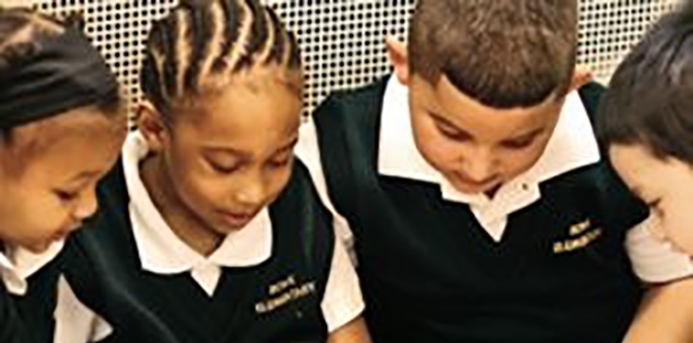Ask anyone why they moved to the North Shore, and chances are, outstanding public education is at the top of the list.
So it’s no wonder that when it comes to giving back, North Shore residents often dedicate themselves to providing top-notch learning opportunities to children in less fortunate communities.
Charter schools are a hot cause both locally and nationally—Mayor Daley, Arne Duncan and the Obama administration are pushing them—because some statistics suggest that they have the greatest potential to transform the lives of children who represent our country’s future.
Naturally, the North Shore is at the forefront of this national trend: Several local groups have already started charter schools in Chicago. Not only have these schools been successful, but they’ve also educated North Shore families, while building bridges between disparate communities and fostering deep understanding.
“There’s a great need for Chicago Public Schools to be improved,” says Jennifer Bisceglia of Kenilworth, who helped found Providence Englewood Charter School on the South Side.
And the cause is also “something we can bring our children into,” she says.
Why Charter Schools Work
Charter schools are publicly funded elementary or secondary schools that have been freed from some of the rules and regulations that apply to other public schools, in exchange for accountability for certain results, as set forth in each school’s charter, which is up for renewal every three to five years.
Because of their freedom to innovate, charter schools have the potential to encourage education reform and develop new, creative teaching methods that can be replicated in traditional public schools for the benefit of all children, too.
Some charter schools are better than others, but there’s ample evidence to show that the good charter schools really work. The Noble Network of Charter Schools (noblenetwork.org), which is the largest in Chicago and includes seven campuses as of 2009, is the city’s top performing charter based on ACT score.
Students often enter ninth grade two-to-three years behind in math and reading, but by junior year they achieve a high enough ACT score to go to college, which Noble attributes to the commitment of its teachers.
And charters aren’t just about math and reading—they’re also about creating a unique school culture that builds character. Many charters have strict discipline codes. Perspectives Charter Schools, which operates five schools in Chicago, bases its code on the 26 principles of “A Disciplined Life,” and students take an ethics class daily.
Different schools have different approaches, so naturally some schools appeal to certain North Shore families more than others.
Privileged Partnerships
About five years ago, Denise and Doug Nash of Kenilworth, along with roughly 20 other families, formed the Kenilworth Partnership. Among themselves, the families raised $500,000 to start a charter school—Providence Englewood, an elementary school on the South Side, based on the philosophy of community leader Paul Adams, who started the highly successful Providence-St. Mel High School, the subject of the acclaimed 2009 documentary “The Providence Effect.”
The Kenilworth Partnership is just one of these loosely formed groups on the North Shore. Winnetka has two partnerships, an eponymous one and the Woodley Road Partnership.
Glencoe has recently formed a partnership as well. “It doesn’t just fund education, it allows us to learn, it bridges the differences between our communities,” Nash says.
Providence Englewood has “build a friendship between two communities that wouldn’t normally know each other,” she says. The Girls Scouts at Joseph Sears Elementary School in Kenilworth collect leftover, unused school supplies at the end of the year and donate them to Providence Englewood.
It’s “one school helping another,” Bisceglia says. “We’re in a public school. They should be on par.”
Anne Mueller of Wilmette is on the board of the Noble Network, where she first got involved as a tutor via the Northwestern University Settlement Association, which started the network, with the first school located inside its Westtown headquarters.
Mueller particularly enjoys involving her children, who both attend New Trier. While a New Trier education has long been considered enviable, some of these charter schools are turning out to be the envy of North Shore.
“I would so like to go to this school,” one of Mueller’s children remarked after a visit. “The teachers—you could tell that they cared about every single kid in that classroom.”
Be part of the Renaissance
There are numerous ways you can help the charter school movement. Here are a few ideas to get you started.
1. Do your homework. From the Internet to books to documentaries, there is a ton of information available that offers how-to guides. Be sure to visit our education section online for a complete list of national and local resources.
2. Take a tour. Most charter schools are more than happy to offer you a tour. For a list of all of Chicago’s charter schools, with links to their individual Web pages, visit the Illinois Council of Charter Schools’ website, www.incs.org. You can also contact Ron Manderschied, president of the Northwestern University Settlement Association, at rmanderschied@nush.org or at 773-278-7471.
3. Give money, give time or give things. Most schools have donation links on their websites. Or, when you talk to or tour a particular school, ask them if they need volunteers for tutoring, coaching or other activities, and ask them what kind of goods they’re in need of. Then, you can organize a drive at your child’s school or another local organization.
4. Start a partnership. Get your friends together and start a conversation about charter schools, and/or see if there’s a local partnership in your area where you can get involved. To find out about local partnerships or how to start one, contact Denise Nash, ddnash@comcast.net, 847-920-9606.
5. Use Make It Better to amplify your friendraising and fundraising efforts. Make It Better is posied to hold charity auctions, publicize events and make a $5 donation for every Better Letter subscription a nonprofit sends our way.

